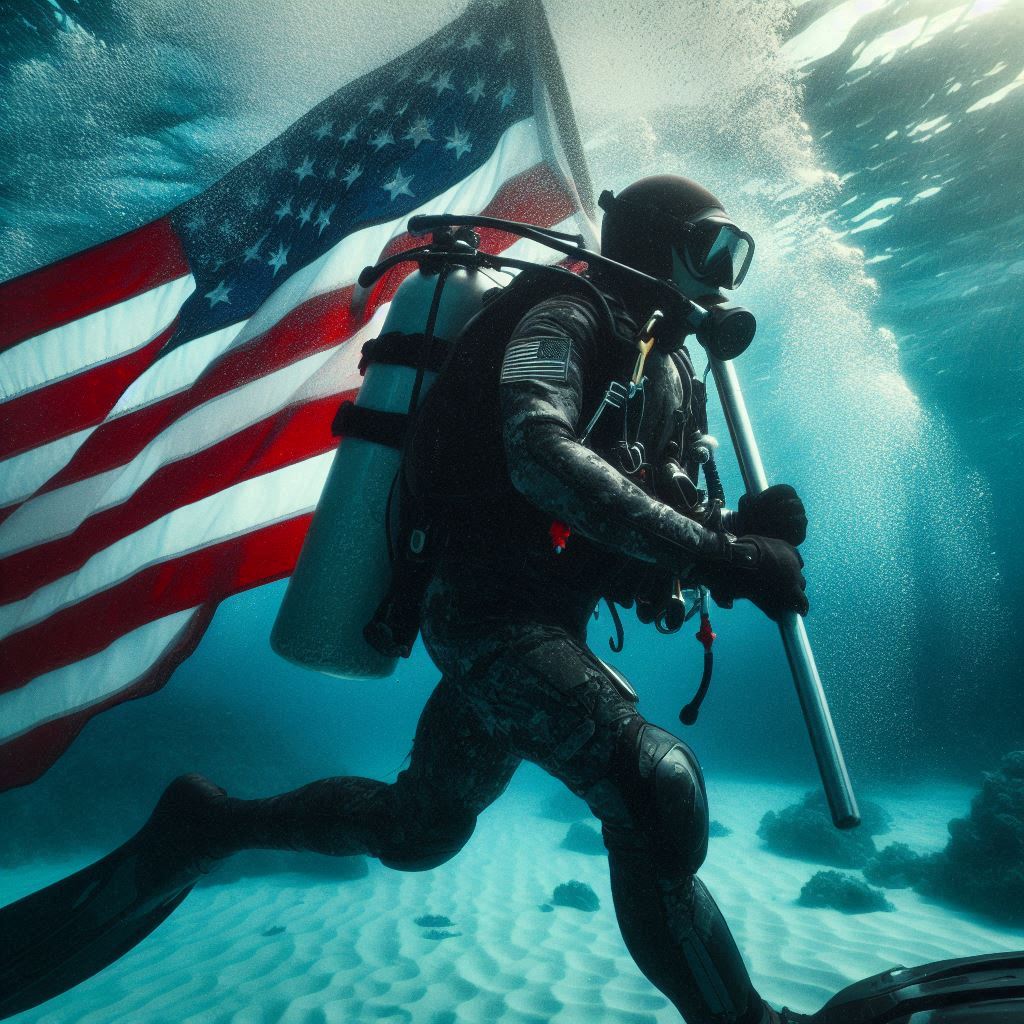
As fireworks illuminate the night sky this 4th of July, we celebrate the spirit of American independence – a spirit of freedom, exploration, and pushing boundaries. But did you know that beneath the surface of our celebrations lies a hidden history of underwater exploration and innovation, deeply intertwined with the very ideals we hold dear?
From the Revolutionary War to the modern day, scuba diving has played a significant role in American history, aiding in military operations, scientific discovery, and even the exploration of outer space. At Dive Right In Scuba, we're not just passionate about diving; we're fascinated by the history that has shaped this incredible sport. So, let's take a deep breath and dive into the depths of time to explore how scuba gear has helped shape American freedom and exploration.
The Early Days of American Diving (Pioneers and Patriots)
Long before the days of sleek wetsuits and high-tech regulators, American ingenuity was already making waves in the underwater world. During the Revolutionary War and the Civil War, divers played crucial roles in salvage operations, recovering valuable cargo and clearing harbors of obstacles. While rudimentary diving bells were used for underwater work, their primary function was not warfare.
The evolution of diving technology continued throughout the 19th and early 20th centuries, with American inventors playing a key role in developing improved diving helmets and suits. These innovations allowed divers to stay underwater for longer periods and explore deeper depths, opening up new possibilities for underwater exploration and discovery.
World War II: Scuba's Military Impact
The Second World War marked a turning point in the history of scuba diving. The U.S. Navy recognized the strategic advantage of having divers who could operate underwater without the constraints of bulky diving suits and air hoses. This led to the formation of the Underwater Demolition Teams (UDT), who played a crucial role in clearing underwater obstacles and conducting reconnaissance missions.
The Office of Strategic Services (OSS), a precursor to the CIA, also recognized the potential of scuba diving for covert operations. They established the OSS Maritime Unit, a team of skilled divers who conducted daring missions behind enemy lines. The OSS Maritime Unit also played a key role in the development of early rebreathers, closed-circuit breathing systems that allowed divers to operate stealthily without leaving a trail of bubbles.
The war also saw the introduction of the Aqua-Lung, co-invented by Jacques Cousteau and Émile Gagnan in 1943. This revolutionary self-contained underwater breathing apparatus (SCUBA) was quickly adopted by militaries around the world, including the U.S. Navy, and paved the way for the widespread use of scuba diving in both military and civilian applications.
The Space Race and Underwater Exploration (Reaching for the Stars...and the Depths)
As the United States and the Soviet Union competed in the Space Race, scientists and engineers turned to the ocean to simulate the challenges of space exploration. The U.S. Navy's SEALAB experiments involved sending teams of aquanauts to live and work in underwater habitats for extended periods. These experiments provided valuable insights into the effects of long-term exposure to extreme environments, contributing to our understanding of human physiology and psychology.
Advancements in scuba gear and technology during this era also made diving more accessible to the general public. The development of lighter, more comfortable equipment, along with the rise of dive training programs, led to a boom in recreational diving. This newfound popularity opened up opportunities for underwater exploration, research, and conservation efforts.
Scuba diving also played a crucial role in underwater archaeology and exploration. Divers were able to access previously unreachable shipwrecks and historical sites, uncovering artifacts and information that shed light on our maritime heritage. These discoveries helped to connect us to our past and sparked a renewed interest in underwater exploration.
Modern-Day Applications: Scuba Diving's Impact Today
Today, scuba diving continues to play a vital role in various fields, from military and commercial applications to scientific research and environmental conservation.
Military and commercial divers rely on scuba gear for underwater construction, salvage operations, and search and rescue missions. Scientific divers use scuba to study marine life, conduct underwater surveys, and collect data on oceanographic conditions. And recreational divers play a crucial role in environmental conservation efforts, participating in underwater cleanups, monitoring coral reefs, and raising awareness about the importance of protecting our oceans.
Perhaps most importantly, scuba diving fosters a sense of community and shared purpose among divers. Whether it's exploring a new dive site, sharing stories of underwater encounters, or working together to protect our oceans, the diving community is a testament to the power of collaboration and the human spirit of adventure.
Dive Right In Scuba: Your Gateway to Underwater Adventure
At Dive Right In Scuba, we're proud to be part of the rich history of American diving. Not only do we sell the best diving gear, we also offer a variety of scuba diving courses and certifications, from beginner to advanced, that will equip you with the skills and knowledge to explore the underwater world safely and responsibly.
Join us in celebrating the spirit of freedom and exploration that defines both scuba diving and the 4th of July. Whether you're a seasoned diver or a curious newcomer, Dive Right In Scuba is your gateway to underwater adventure.
Have a Happy and Safe 4th of July
As we celebrate the 4th of July, let's also take a moment to appreciate the incredible journey of scuba diving in American history. From its early days in salvage and military operations to its modern-day applications in science, exploration, and conservation, scuba diving has played an integral role in shaping our understanding of the underwater world and the spirit of freedom that defines our nation.
So, this Independence Day, let's raise a toast to the pioneers, innovators, and adventurers who have helped make scuba diving the beloved sport it is today. And let's continue to explore, protect, and cherish our oceans for generations to come.
